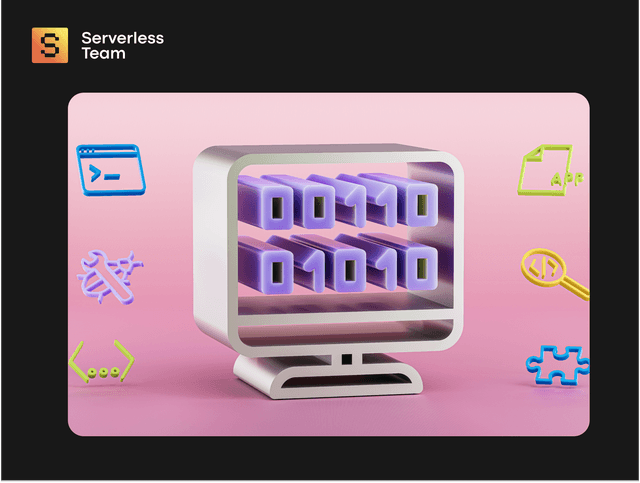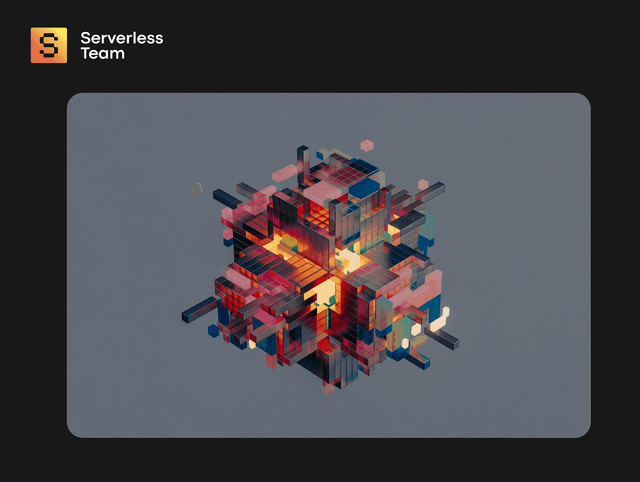The adoption of cloud platforms and services is snowballing, with a year-over-year growth rate of over 45%. Businesses are leveraging the cloud for IT services and to enhance business performance, drive innovation, and achieve strategic goals.
However, the abundance of cloud providers on the market makes it quite difficult to choose without going to the 3d page of the Google search *gasp.* Some headbanging on the wall is included but not necessary.
Should we go with AWS or Google Cloud Platform? No, let's do Azure. Maybe we should look at smaller providers? Well, there's no simple answer. The approach to selecting a cloud platform depends on your company's size, specific business needs, resources, and budget you're willing to sacrifice.
Small businesses usually have limited resources and prioritize simplicity, affordability, and ease of adoption. For mid-sized companies, the cost-efficiency and ease of adoption are the deal-breakers, as they want to avoid additional pricy training.
When it comes to the enterprise, its primary concerns are security, scalability, and integration capabilities. Does the cloud provider offer robust scalability options? Does it provide comprehensive security measures like data encryption, access control, and compliance certification? Can it integrate with existing systems, such as CRMs, ERPs, and HR software? Would the provider have dedicated support and proactive monitoring?
In this article, we are comparing Amazon (AWS) vs. Google (GCP) vs. Microsoft (Azure) for enterprise business and answering all of these questions and more. So, read on.

We take care of serverless development so you can focus on your business
Don't want to wait for our site launch? Let's talk about your idea right now.


Factors to Consider for Enterprise App Development
Whether you are planning to build a new app from scratch or move a part of your enterprise apps into the cloud, there are many factors to consider to ensure you maximize its effectiveness.
Here are what our specialists look at when they advise on cloud provider selection for enterprise app development, along with the difference between AWS, Azure, and GCP in how they address these factors:
Compatibility and Integration
The first thing we look at is how the existing system will fit and, most of all, benefit from a particular cloud provider to ensure their seamless integration with cloud services. For example, AWS provides a wide range of services and APIs, including AWS Lambda for serverless computing and AWS App Mesh for microservices communication offering extensive compatibility and integration options with various systems and apps. Instead, the Google Cloud Platform emphasizes compatibility with popular open-source technologies and enables seamless integration with existing systems. And Azure supports a wide range of programming languages, frameworks, and tools for easy compatibility and integration.
Security and Compliance
Once we cover that, integration will be smooth, this is the second most important thing we cover. With highly confidential client data coming in 24/7, enterprises must prioritize security and compliance with industry regulations. AWS, GCP, and Azure are all solid in terms of their security approach. They provide robust security measures, including encryption at rest and in transit, identity and access management (IAM), threat detection, and compliance certifications such as ISO 27001, SOC 2, and HIPAA.
Scalability and Performance
As we know, enterprise apps need to handle fluctuating workloads and scale resources dynamically to meet the demand. AWS, GCP, and Azure offer auto-scaling capabilities, load balancing services, and flexible infrastructure options like virtual machines, containers, and serverless computing to ensure scalability and optimal performance.
Reliability and Uptime
Enterprise apps must maintain high availability and minimize downtime. AWS, GCP, and Azure operate global data centers with redundant infrastructure, data replication, and backup services to ensure high reliability and uptime for critical applications.
Cost and Pricing Models
People tend to think that since enterprises are enormous, they have budgets to spare, right? Wrong. Just like any other business, enterprise needs to spend their money efficiently. Thankfully, all these cloud providers offer various pricing models, including pay-as-you-go, reserved instances, sustained use discounts, and hybrid use benefits, allowing enterprises to optimize costs based on their specific needs.
Management and Monitoring Tools
These are a must to ensure your money are well-spent. Enterprise needs a set of effective management and monitoring of cloud resources a to monitor, analyze, and optimize their cloud environments. AWS, GCP, and Azure provide comprehensive management consoles, dashboards, and monitoring tools like AWS CloudWatch, GCP Stackdriver, and Azure Monitor, enabling enterprises to monitor, analyze, and optimize their cloud environments. It all depends on what console is easier to use for the team.
Vendor Lock-In and Portability
As an enterprise, you may get concerned about getting stuck with one provider needing more ability to migrate once the market gets disrupted by something better. Rest assured, AWS, GCP, and Azure offer technologies and services that promote portability, such as containerization (AWS ECS, GCP Kubernetes Engine, Azure Kubernetes Service) and interoperable standards like Kubernetes and OpenStack. So you'll be able to use the services of more than one provider or migrate if you want to.
Support and SLA
Training your employees to adopt new technologies is problematic. Of course, enterprises require reliable technical support and service-level agreements to get timely assistance and guarantee uptime. AWS, GCP, and Azure all offer different support plans and SLAs, including 24/7 customer support, enterprise-level agreements, and service credits for downtime.
Industry Expertise and Partnerships
Enterprises often seek cloud providers with expertise in their industry and strategic partnerships. AWS has an extensive partner network and offers specialized solutions backed by a robust ecosystem of partners. GCP has partnerships with various technology and consulting companies, which businesses can benefit from. And Azure, with its leading technology providers, offers industry-focused solutions, providing specialized expertise and tailored solutions for specific sectors.
Future Growth and Innovation
Enterprises need cloud platforms that enable future growth, innovation, and access to emerging technologies. AWS, GCP, and Azure are innovators and invest tremendous sums into research and the discovery of new services. AWS is widely known for its continuous innovation and early adoption of emerging technologies, while GCP and Azure emphasize their capabilities in AI/ML, IoT, and big data analytics.
Here at Serverless, we think they are all great cloud providers. However, It's important to note that each cloud provider's suitability depends on the enterprise's specific requirements and priorities. Factors such as existing technology stack, preferred programming languages, industry focus, and specific project needs must also be considered.
That's why we recommend conducting a thorough evaluation, drawing a list of your requirements, and getting expert advice to determine the best fit for your enterprise app development needs.

Kyrylo Kozak
CEO, Co-founderGet your project estimation!

AWS, Azure or Google Cloud Platform?
While it may seem like an easy task, choosing between AWS, Google Cloud Platform and Azure is complicated. So buckle up, and let us introduce you to three cloud giants.
Amazon Web Services
Introducing Amazon Web Services (AWS), the heavyweight champion of cloud providers since its launch back in 2006. AWS started its cloud journey with the groundbreaking S3 Simple Storage Service, giving folks the power to store their data in the virtual sky. And not long after, they unleashed the EC2 Elastic Compute Cloud, serving up computing resources over the internet like a hot slice of Silicon Valley pizza.
AWS quickly became a pioneer in cloud computing, dazzling the world with its extensive menu of over 200 cloud services, including the latest flavors of machine learning and AI. They've dominated the global cloud spending game, snatching up a juicy 32% in Q1 2023, leaving their closest competitors, Microsoft Azure and Google Cloud, looking like a couple of aspiring comedians at an open mic night.
Now, picture this: in 2022, AWS launched its version of "Local Zones" in the US. These Local Zones are like little pockets of cloud magic spread across the country, offering single-digit millisecond latency to millions of people. And brace yourself, because AWS plans to bring these Zones to 32 metropolitan areas in 26 countries.
Let's crunch some numbers:
- AWS has been growing at a staggering rate of 34% annually over the past two years.
- They had a mind-blowing 37% YoY growth in Q1 of 2022, with sales skyrocketing to a whopping $21.4 billion in Q4 2022.
- AWS recently announced a second infrastructure region in Australia, with plans to invest a cool $4.5 billion Down Under by 2037.
Microsoft’s Azure
Let's switch gears and meet Microsoft Azure, the cloud superstar born in 2008. Back then, it was just a scrappy competitor to Amazon's EC2 services, but Azure didn't take long to shine. With over 600 cloud services under its belt, including cloud-native Ampere processors and AI wizardry, Azure has become the go-to cloud platform for millions of businesses and individuals worldwide.
Azure's secret sauce lies in its deep integration with the entire Microsoft stack. They've got the ultimate tag team power, seamlessly integrating with all the Microsoft tools and technologies you know. But there's more! Azure's hybrid cloud capabilities are the real MVPs. They bridge the gap between the cloud and your on-premises infrastructure, creating a harmonious symphony of data and applications.
Azure secured a solid 23% market share at the end of 2022 and maintained that badass position through Q1 2023. And get this: back in 2020, 63% of organizations ran their applications through Microsoft Azure.
Google Cloud Platform
Now, let's set our sights on the Google Cloud Platform (GCP), the new kid on the block making some serious waves. They debuted in 2011 with the App Engine, offering web application development resources in their mighty Google data centers. With GCP, Google brings its unparalleled data analytics and AI expertise to the cloud party, making it a top choice for forward-thinking enterprises.
GCP offers over 100 services, from Google Cloud Platform for infrastructure needs to Google Workspace (formerly G-Suite) for all productivity essentials. They even sprinkle in some machine learning APIs and enterprise versions of Android and ChromeOS. It's like having a buffet of tech goodness at your fingertips!
Let's dish out some tasty stats about GCP:
- Between 2017 and 2022, Google Cloud nearly doubled its market share from 6% to 11%, proving they're not just a one-hit-wonder.
- In 2021 alone, GCP generated $19 billion in revenue, a slice of Google's overall revenue pie.
- Google Cloud hosts more than 1.42 million websites, including big names like Spotify.
GCP's got some unique strengths up its sleeve. They're all about pushing the boundaries of innovation, offering cutting-edge technologies that make other clouds green with envy. With their powerful data analytics and BigQuery services, they'll make your data sing like a rockstar on the stage. And let's not forget their cloud-native approach, especially with Kubernetes and container-based deployments.
| AWS | Azure | GCP | |
|---|---|---|---|
| Global Infrastructure | 25 geographic regions, 84 availability zones |
60 regions, 160 data centers |
26 regions, 100 points of presence |
| Services | 200+ services | 600+ services | 100+ services |
| Market Share | 32% | 23% | 10% |
| Pros | 1. Allows to use the already familiar programming models, operating systems, databases, and architectures. 2. Hybrid capabilities 3. Extensive and mature service offerings 4. Enterprise-friendly services 5. Global reach |
1. Seamless integration with Microsoft tools 2. Top in development and testing tools 3. Opensource support 4. Hybrid cloud 5. Broad feature set |
1. Designed for cloud-first businesses 2. Open source support and portability 3. Discounts & flexible contracts 4. Extensive DevOps expertise |
| Cons | 1. Challenging adoption 2. Complicated cost management 3. Overwhelming options |
1. Messy documentation 2. Incomplete management tooling 3. Less flexible |
1. Lacks data centers over the world 2. Fewer services and features 2. Smaller partner ecosystem |
| Pricing | Per hour | Per minute | Per minute |
Recommendations and Decision-Making Factors
Based on different enterprise app development scenarios or requirements, here are some recommendations for cloud platform selection:
Small-scale app development with limited resources:
- Recommendation: AWS (or Azure)
- Reasoning: These platforms offer simplicity, affordability, and ease of adoption, which are important considerations for small businesses with limited resources.
Mid-sized enterprise app development with cost-efficiency and ease of adoption as priorities:
- Recommendation: AWS, Azure or GCP
- Reasoning: All three platforms provide cost optimization options and flexible pricing models, allowing mid-sized companies to optimize costs based on their specific needs. Consider the strengths and weaknesses of each platform, as well as compatibility with existing systems and preferred programming languages.
Enterprise-scale app development with a focus on security, scalability, and integration capabilities:
- Recommendation: AWS, Azure, or GCP
- Reasoning: These platforms excel in providing robust security measures, comprehensive scalability options, and seamless integration with existing systems. Evaluate each platform's offerings, such as encryption, access control, compliance certifications, scalability features, and integration capabilities, to align with the enterprise's specific requirements.
Industry-specific app development with specialized expertise and partnerships:
- Recommendation: AWS or Azure (also GCP, but only if you have to)
- Reasoning: AWS offers a large partner network and specialized solutions, Azure has strong integration with Microsoft tools and offers industry-focused solutions. GCP is the weakest character in this round, but it brings innovations to the table, so let’s cut it some slack.
Future growth and innovation-driven app development:
- Recommendation: AWS, GCP, or Azure (in this specific order, yes)
- Reasoning: AWS, GCP, and Azure are known for their continuous innovation and investment in emerging technologies. AWS has a reputation for early adoption of emerging technologies, GCP focuses on cutting-edge technologies like AI/ML, IoT, and big data analytics, and Azure offers a range of services for AI and ML. Select the platform that aligns with the enterprise's future growth plans and desired access to emerging technologies.
It is important to consider the enterprise's specific requirements, priorities, and preferences in each scenario. Conduct a thorough evaluation, including compatibility, scalability, security, industry expertise, and future growth potential, to determine the best fit for enterprise app development needs. Or better, give us a call, and we’ll help you make an informed decision.
Summing up
Cloud platforms have become a hot choice for businesses aiming to up their game. But let's face it, picking the perfect cloud provider can be quite a challenge with so many options available. It's important to consider factors like company size, specific needs, resources, and budget.
Small businesses dig simplicity and affordability, while mid-sized companies want bang for their buck without the extra training hassle. When enterprises step into the cloud arena, it's all about security, scalability, and seamless integration. They need a provider that offers strong security measures that make hackers shiver, scalability options that can handle any workload, and integration capabilities that seamlessly connect the dots in their existing systems.
So, let's get down to business and compare the cloud heavyweights: Amazon Web Services (AWS), Microsoft Azure, and Google Cloud Platform (GCP). These big shots bring their A-game in compatibility, security, scalability, reliability, cost-effectiveness, management tools, portability, support, industry expertise, and future growth potential.
AWS, the trailblazer of cloud providers, boasts a vast range of services and a market share that'll make your head spin. Azure seamlessly syncs up with all your favorite Microsoft tools. And GCP brings some serious innovation to the table with data analytics and AI prowess.
To make the right choice, take the time to evaluate your needs. Remember, the cloud provider that ticks all the boxes and speaks your language will set you up for success in the land of limitless possibilities. And if choosing on your own is too hard, Team Serverless is only a call (or an email) away – reach out to find AWS Cloud Migration Services experts.





